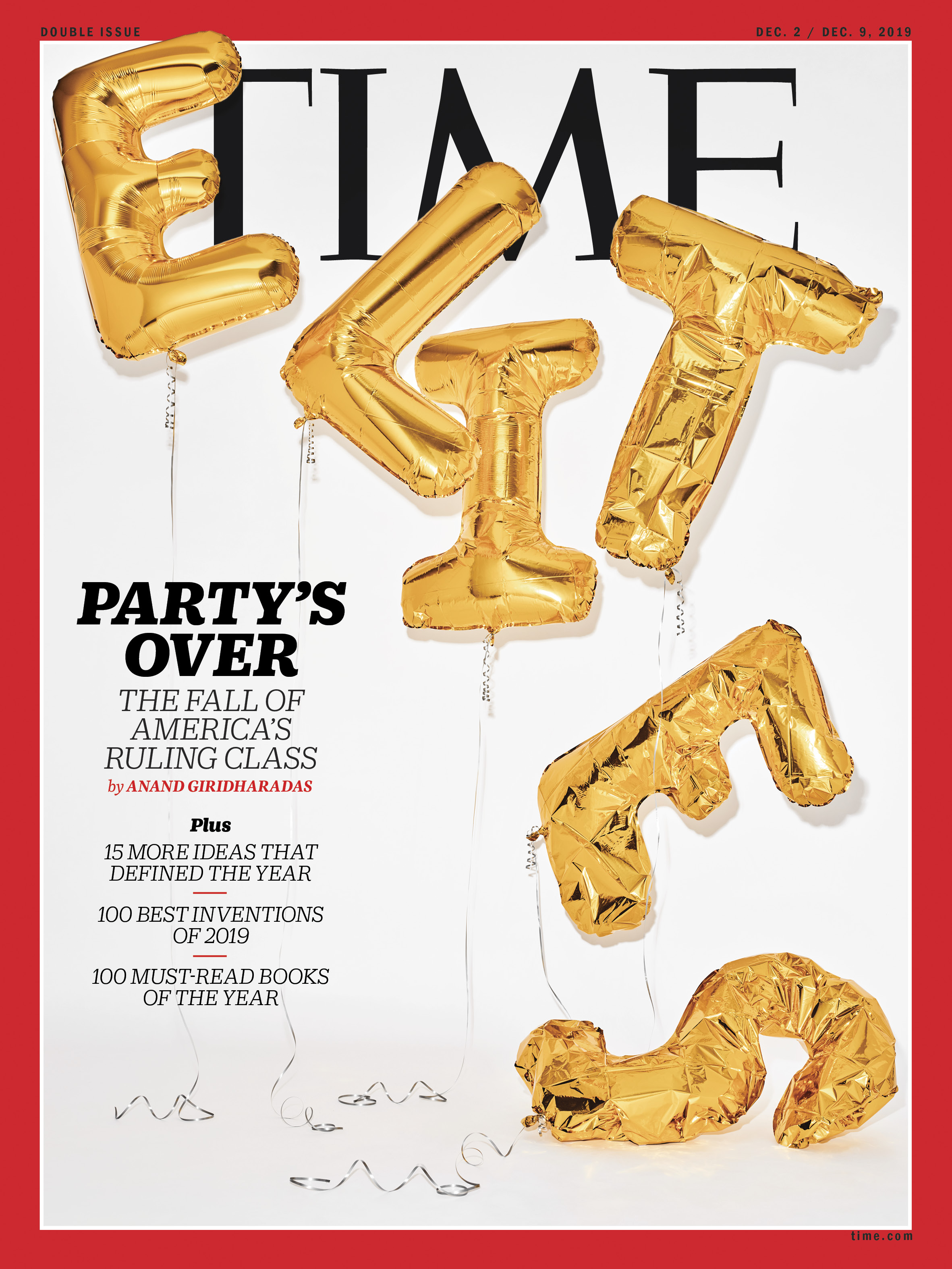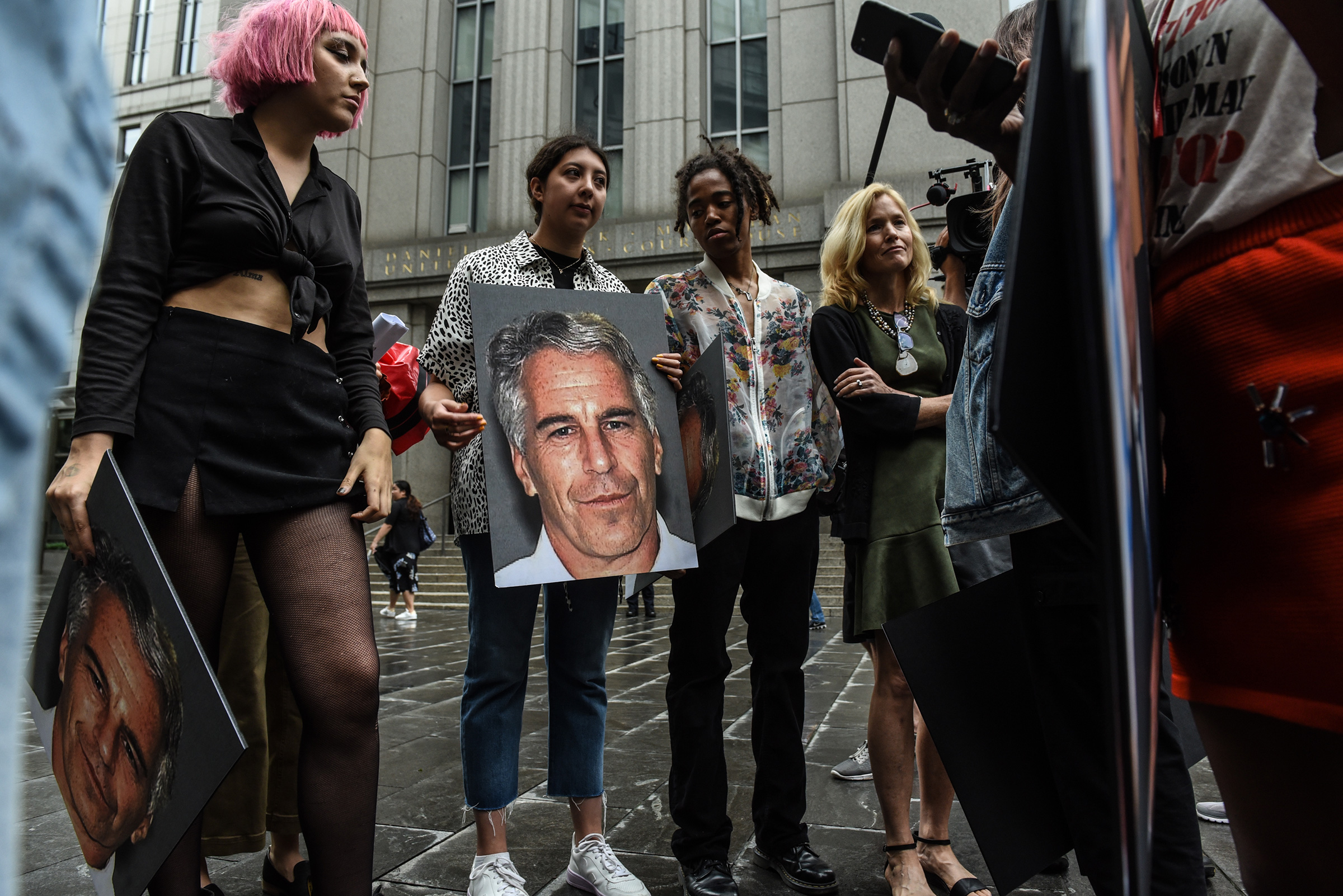
Giridharadas is the author of The Persuaders: At the Center of the Fight for Hearts, Minds, and Democracy. He is also the author of Winners Take All: The Elite Charade of Changing the World, The True American. He is a political analyst for NBC News and teaches at NYU.
On March 29, 2003, at a wedding reception in the Harvard Faculty Club, Lawrence W. Reed gave a toast in honor of the friend whom he was serving as best man—one Joseph P. Overton. Overton had worked at Dow Chemical; he had since become an executive at a free-market, small–government think tank in central Michigan. Among his duties at the Mackinac Center for Public Policy was raising money, and in doing so, he had made a brochure that would become his legacy. Overton was trying to describe the role of think tanks in a society, and he posited an idea that would come to be called the Overton window. In a given society, at a given moment, there is a range of policies politically acceptable to the mainstream. (A 70% top tax rate and a 20% top tax rate are both within this window in America today; abolishing taxes is not.) Generally, the theory went, politicians will only propose ideas that fall within the window. It falls to think tanks (and others) to propose unpopular things outside of the window in the hope of shifting the window and making the previously unthinkable achievable. Overton was an ardent libertarian who pushed ideas like school choice—and, according to Reed’s wedding toast, he had on occasion resorted to more extreme methods of moving the window of the possible, “including the time,” Reed recounted that day, “we flew in a Cessna 172 in broad daylight at treetop level 150 miles into war-torn Mozambique to assist armed rebels fighting the Marxist regime there.” Overton died just weeks after his wedding.
Were Overton still alive, he would be pushing 60—and might be aghast to learn that his “window,” having become famous after his death, is now invoked to describe America’s great, unlikely backlash against the system he defended so ardently: capitalism.

A democratic socialist—Bernie Sanders—is among the top contenders to be the next Democratic nominee for U.S. President. His rival and fellow Senator, Elizabeth Warren, is also among the top tier of candidates, declaring herself a capitalist who wishes to transform American capitalism as we know it, with a wealth tax, a Green New Deal and the elimination of private health insurance. A more centrist candidate, Mayor Pete Buttigieg of South Bend, Ind., illustrated the shifting winds when he recently declared that “neo-liberalism is the political–economic consensus that has governed the last 40 years of policy in the U.S. and U.K. Its failure helped to produce the Trump moment. Now we have to replace it with something better.” In 2016, the Democratic Socialists of America (DSA) had 5,000 members; since then, its dues-paying membership has multiplied more than tenfold. This new energy on the left terrifies chief executives and billionaires, and yet many of them have been voicing similar alarms about a crisis of capitalism. Ray Dalio, the billionaire co-chairman of the investment firm Bridgewater Associates, warned in April that America faced a “national emergency” in capitalism’s failure to benefit more people, and he pronounced the American Dream lost. The anti-capitalist impulse has some purchase on the right too. Before he pushed a tax cut that lined the capitalists’ pockets, Donald Trump ran, most improbably, as a Republican skeptical of the financial elite’s loyalty to Americans. On Fox News, Tucker Carlson has entertained a surprising skepticism of capitalist doctrines and said positive things about Warren.
America loves a capitalist reckoning the way the NFL loves Colin Kaepernick. But it is having one anyway. And if this year that reckoning seemed to reach new intensity, it was because the economic precariousness, stalled mobility and gaping social divides that have for years fueled the backlash now had an improbable sidekick: plutocracy itself and the win-win ideology that has governed the past few decades. This year, America’s ultra-elites seemed to bend over backward to lend support to the idea that maybe the system they superintend needs gut renovating. As a political movement bubbled up to challenge their wealth and power, the elite’s own misbehavior trickled down. And where the two met, ideas that once seemed unutterable started, to many, to sound like the future.
History is the story of conditions that long seem reasonable until they begin to seem ridiculous. So it is with America’s present manic hyper-capitalism.
Until recently, it seemed normal that a technological revolution that began with promises of leveled playing fields had culminated in an age of platform monopolies. Normal that businesspeople should try to make as much money as possible by paying as little as possible in taxes and wages, then donate a fraction of the spoils to PR-friendly social causes. Normal that economic security for most Americans was becoming a relic of the past. Normal that people in the street-level marijuana business go to prison while people in the business of selling ads to Russian intelligence go on magazine covers. Normal that bankers could shatter the world economy with their speculating, and that they would be among the few to be made whole after the crisis.
For years, there have been voices trying to denormalize this state. There were protests in Seattle in 1999, there was Occupy in 2011, there was the DSA, there was the World Social Forum to rival the World Economic Forum, there was, eternally, Bernie Sanders saying the exact stuff he is still saying today, there were civic groups trying to organize workers and poor communities, there were outcasts in Silicon Valley warning that Mark Zuckerberg wasn’t really about human connection. But America was in the grips of the ideological consensus that Buttigieg described. Hyper-capitalism was the intellectual stadium in which the country played. There was a left side of the field, more wary of capitalism’s extremes, and a right side of the field, prone to capitalist boosting. But the stadium, as Overton understood, demarcated the boundaries of the debate for most people: Capitalism, more or less as we practice it, is our system, and it is the best system, so how do we tweak it to make it better?

Then, in 2016, something happened. Sanders ran for President. He built a formidable national movement, powered by small donations, and won 22 states—mind you, as a democratic socialist in the United States of America. Sometimes the thing that could never happen happens, and it makes people doubt their sense of reality. And in that election cycle, if Sanders discredited capitalism as a conscious project, his cause received unexpected, unintentional help from the man who would become President. Trump ran as a flamboyant capitalist, wary of certain aspects of capitalism, but promising that his capitalist mind and his capitalist fortune would make him a uniquely gifted, uniquely incorruptible President. When that turned out not to be the case, Trump not only damaged himself but the idea of the selfless billionaire savior too.
The Overton window was moving. Then came the 2018 midterms and a new wave of Democratic -candidates—most prominently, Representative Alexandria Ocasio-Cortez of New York—questioning capitalism–as–capitalism in a way that seemed unfamiliar and fresh. As the 2020 campaign approached, Warren jumped into the race, a beneficiary of the opening Sanders had helped carve for capitalist–critical aspirants to America’s highest office. With her now famous litany of “plans,” Warren detailed an agenda that would put American business in a headlock. That she and Sanders, both veritable enemies of Big Business, are among the top candidates shows how much the politics of capitalism has changed.
Who should be TIME’s Person of the Year for 2019? Cast your vote in the reader poll.
But, politics can be abstract; it can be complicated; people are busy living. Politics often benefits from scandal, from prominent misbehavior, from a dramatization of the discourse. And this was what was so remarkable about 2019: because of the coming election in these populist times, it was already a year potentially full of trouble for the plutocrats—or plutes, as I like to call them (to save space and, thus, paper and, therefore, trees). But, almost as if to assist the cause, the plutes seemed this year to put on an extended exhibit of performance art whose plain, if unstated, thesis is that plutocracy is maybe a bad idea.
Exhibit A: Early in the year, Amazon, run by one of the world’s richest people, Jeff Bezos, announced it was pulling out of its planned Hydra-like “second headquarters” in New York City. It seemed to come as a surprise to Bezos that in a city where a significant number of people struggle to keep up with rising costs and stagnant pay, many weren’t excited by the idea of the state and city giving his company a few billion dollars in tax breaks that wouldn’t be available to a regular Joe starting a business. In the debate that erupted, the conventional wisdom that it is always better to attract jobs, even by offering companies major incentives, came to be questioned.
Exhibit B: The college-bribery scandal. Wealth and privilege are already great guarantors of securing a spot in a university. What the scandal unearthed by federal prosecutors illustrated is that many very rich people are not satisfied with the general advantage of hyper-privilege, nor even with the specific advantage of donations to universities that give you an edge but not a guarantee. The ascendant critics of capitalism in American politics have called the system “rigged” for years. But here was a biopsy of the rigging. The most revealing subplot of the college scandal was the arrest of Bill McGlashan. Many others ensnared in the scheme had bolder-faced names, but McGlashan was significant because he had become a symbol of the hope, promoted by so many of the winners of our age, that they would lead the charge toward a fairer society. McGlashan, through the Rise Fund that he helped create and is managed by his private-equity firm, TPG Growth, had helped popularize the growing field of “impact investing”—in which a fund pursues not only economic returns but also the betterment of the world. He was charged with—and pleaded not guilty to—trying to bribe his son into the University of Southern California, thus depriving the people whom he supposedly helped for a living of a fair shot at that college seat.
Exhibit C: In July, Facebook, on account of just one of the scandals hovering over it, this one involving privacy violations, received a $5 billion fine from the Federal Trade Commission. Now, for you, that may be a big fine. For Facebook, it was such a feathery tickle that the company’s stock surged on the news, reaching its highest price in nearly a year. Facebook’s massive market power, its dubious behavior in the face of Russian intelligence activities, its fueling of polarization and its enabling of mis-information and even violence were unaffected by the FTC fine—a penalty that, if anything, left the impression that companies like Facebook enjoy near total impunity.
Still, in response to these scandals and outrages, many in the business world declared themselves newly interested in reform. The most prominent and heralded instance this past year was a statement by the Business Roundtable, an umbrella organization whose members are the chief executives of many of America’s largest companies. For decades, the roundtable has clung to a particular interpretation of the purpose of a business—that it is solely to make money for shareholders. With its new statement, issued in August, the roundtable updated its view: “Business Roundtable Redefines the Purpose of a Corporation to Promote ‘An Economy That Serves All Americans.’”
It was inspiring, limited stuff. What it really revealed was how hard it will be for the old-guard capitalists to change at all. The statement was a call for every corporate signatory to decide, voluntarily, to behave in ways more supportive of people and the planet. As far as I know, no company, because of the statement, announced the cessation of practices in lobbying, tax avoidance, employment or other realms. When I publicly questioned the teeth of a pledge that reminded me of my own pledges not to eat fries, Jamie Dimon, the chief executive of JPMorgan Chase and chairman of the roundtable, contacted me. We talked on the phone for half an hour. He was incredulous that I didn’t trust that the pledge would mean action. I challenged him to give the pledge teeth. Why not begin to lobby for proposals in Congress that would make “stakeholder capitalism” the law, not just an airy promise? Why not excommunicate companies that lobby for things contrary to the stated values of the roundtable? He said the roundtable wasn’t a “police force.” When I put to him that many signatories of this pledge to treat people better were known to be fairly exploitative of workers, he pushed back with words that illustrate that self-reformed capitalism is a lot like unreformed capitalism, but with better public relations. He said that he knew the chief executives I was talking about, and that he liked them; they were good people; he was sure they were kind to employees. Plus, he said, “A lot of people just don’t like to work.” (A spokes-person for Dimon later said to the Washington Post, “These quotes don’t reflect the conversation.”)
In public relations, an important term of art is “getting out ahead of the story.” If bad news about you is coming, pre-empt it by telling the story on your terms. The Business Roundtable’s move, long on rhetoric, short on support for any actual reforms with teeth, seemed very much in that tradition: get out in front of the backlash to extreme capitalism by proposing an optional Capitalism Lite. Then there is the other classic way in which the plutes get out in front of such backlashes: philanthropy. If you’re Goldman Sachs, contribute to a financial crisis that costs millions of men and women their homes and livelihoods, then give back (and scrub your name) through something like the “10,000 Women” program to mentor entrepreneurs.
Yet this year more people seemed to see through this take-and-give playbook. A striking moment came in late March when New York State, led by its new attorney general, Letitia James, filed a lawsuit against members of the Sackler family and others whom it accused of abetting the opioid crisis. In addition to alleging malfeasance in selling the drugs, the complaint made a claim about the use of philanthropy to lubricate wrongdoing. “Ultimately, the Sacklers used their ill-gotten wealth to cover up their misconduct with a philanthropic campaign to whitewash their decades-long success in profiting at New Yorkers’ expense.” The suit cited donations to many arts institutions, resulting in Sackler wings and institutes and centers, while also serving to cleanse their name in a way that allowed the grim machinery of drug peddling to grind on for years.

Then there was the Jeffrey Epstein case. Epstein, the late sexual predator and maybe tycoon, gave endless ammunition to plutocracy’s critics. Here was a man who had allegedly trafficked and raped children; who had been convicted of serious offenses; and who managed, through deftly arranged philanthropy and social climbing, to re-establish himself in high society. Epstein ingratiated himself with Harvard. He gave money to the Massachusetts Institute of Technology and was given the chance to meddle in its research—a phenomenon that one writer aptly called “sugar-daddy science.” He even spent a surprising amount of time with Bill Gates, a children’s advocate who has since apologized for his lapse in judgment. Yet what Epstein revealed was less individual lapses than systemic rot in our culture—especially at our universities, which have become drive-through reputational laundromats.
As the chances have increased that a candidate outside the neoliberal consensus will win the nomination, we have begun to see the Great Plute Freakout of 2019. A wave of plutes have weighed in about the dangers of a Sanders or Warren presidency. Although their obvious motivation is clear—not wanting to lose their money to the federal government—that’s seldom how they argue it. Instead, they engage in economic concern trolling—framing their self–preservational worries as being, in fact, worries about you and yours. Zuckerberg of Facebook warned us that taxing wealth would limit the diversity of philanthropic efforts in medical research. Leon Cooperman, a hedge-fund billionaire, warned us that taxing wealth would curb the good works that he and his friends do. And then, in the cherry on top, Michael Bloomberg, the former New York City mayor and media billionaire, made moves to launch his own bid for the Democratic nomination. Peak billionaire may be a billionaire deciding to possibly attempt to purchase a party nomination because of his fear that some candidates in the race aren’t plutophilic enough—and then running against a maybe–billionaire who promised that being a billionaire would make him specially incorruptible and now is in impeachment proceedings over his alleged corruption.
America’s crisis of capitalism has cousins abroad. In Chile, an increase in subway fares triggered massive antigovernment, pro-reform protests in recent months, killing at least 20 and injuring more than 1,000. A slogan of the protests has been “Neoliberalism was born in Chile and will die in Chile.” The protesters have been demanding that education and health care be established as rights under the Chilean constitution. Argentina has also been rocked by protests, as it grapples with an economic crisis, rising hunger, and the angry fallout from an International Monetary Fund bailout last year. In Britain, the chaos of Brexit drags on, fueled by feelings that the economy wasn’t working for enough people and questions about whether billionaires should exist.
The mercy of all this elite failure and backlash is this: the ongoing collapse of any pretense of selflessness among the winners of our new Gilded Age.
If a single cultural idea has upheld the disproportionate power of this class, it has been the idea of the “win-win.” They could get rich and then “give back” to you: win-win. They could run a fund that made them sizable returns and offered you social returns too: win-win. They could sell sugary drinks to children in schools and work on public-private partnerships to improve children’s health: win-win. They could build cutthroat technology monopolies and get credit for serving to connect humanity and foster community: win-win.
As this seductive idea fizzles out, it raises the possibility that this age of capital, in which money was the ultimate organizing principle of American life, could actually end. Something could actually replace it. After all, a century ago, America was firmly planted in the first Gilded Age—and then it found its way into the Progressive Era and the New Deal, an era of great public ambition. Business didn’t go away; it wasn’t abolished; capitalists didn’t go into gulags. It was just that the emphasis of the society shifted. Money was no longer the lodestar of all pursuits.
The choice facing Americans is whether we want to be a society organized around money’s thirsts, a playground for the whims of billionaires, or whether we wish to be a democracy. The second Gilded Age will end at some point. The question is what comes next: What Trump offers is tribal nationalism, strongman politics and plutocrat–friendly policy greased by populist rhetoric. The other possibility is that, as occurred a century ago, a gilded age collapses into an age of reform: an era defined culturally by renewed public purpose and politically by the restoration of the state in areas where people are too powerless to solve problems of their own—defined by the use of shared institutions to solve shared problems. You can already see glimpses of how an age of reform is being dreamed up. Higher taxes on the very fortunate, to be sure; more regulation and worker protections and the like. An attack on climate change almost as dramatic as climate change itself. Programs to give workers greater security. It would be an age in which it was cooler, more thrilling, more admired, more viable to change the world democratically.
If there is one thing that could hasten the end of the age of capital and accelerate the coming of an age of reform, it is a vigorous new culture of joining in American life. Not clicking, not liking, not retweeting, not TikTokking, not screaming at MSNBC/Fox, but actually joining: political movements and civic organizations with memberships so vast that politicians cannot ignore them. The age of capital has been facilitated by a remarkable solidarity among the ultra-fortunate. Putting that period in the museum will take other, broader solidarities.
Giridharadas is a TIME editor at large and the author of Winners Take All: The Elite Charade of Changing the World
More Must-Reads from TIME
- Where Trump 2.0 Will Differ From 1.0
- How Elon Musk Became a Kingmaker
- The Power—And Limits—of Peer Support
- The 100 Must-Read Books of 2024
- Column: If Optimism Feels Ridiculous Now, Try Hope
- The Future of Climate Action Is Trade Policy
- FX’s Say Nothing Is the Must-Watch Political Thriller of 2024
- Merle Bombardieri Is Helping People Make the Baby Decision
Contact us at letters@time.com